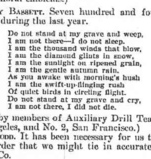

All manifests from the basis of consciousness. Over there the wide ocean and the sky with many galaxies. Taken from his book “No Death, No Fear: Comforting Wisdom For Life,” it says: “This body is not me I am not caught in this body, I am life without boundaries, I have never been born and I have never died. Recently I saw a printed funeral program that included a quote by Vietnamese Buddhist monk and peace activist Thich Nhat Hanh.

If I took money for it, it would lose its value…maybe I’m a nut.”) I still feel that way…it was written out of love, for comfort. (On her decision not to copyright the poem, Frye had this to say: “I thought it belonged to the world it didn’t belong to me. There is no definitive version of the poem, because Frye never published or copyrighted it - she circulated the many copies she made privately. She composed the lines on a brown paper shopping bag, inspired by the plight of her house guest, a young German Jewish woman named Margaret Schwarzkopf, who was unable to visit her dying mother because of anti-semitic unrest in burgeoning Nazi Germany. “Do Not Stand At My Grave and Weep” is a 12-line sonnet and the only known poem by Mary Elizabeth Frye. He later incorporated the song into the score for “The Snow Queen.” Originally, Joyce set “Do Not Stand At My Grave and Weep” to music for the funeral of a friend who was diagnosed with cancer.
#DO NOT STAND AT MY GRAVE AND WEEP SONG MOVIE#
It appears on the soundtrack for the “The Snow Queen,” a 2005 BBC TV movie developed as a vehicle for a set of operatic songs Joyce composed. Joyce’s version to be especially captivating and haunting. It’s a poem that seems to inspire creativity in musicians of many different genres.Īfter having listened to many (I’m certain not all) of these pieces, I’ve found British composer Paul K. Its lines have even been interpolated with other lyrics.

Frye’s wise, comforting lines have been transformed into choral compositions, pop songs, rock songs and folk songs. Since 1932, when florist and Baltimore-based homemaker Mary Elizabeth Frye wrote “Do Not Stand at My Grave and Weep,” quite a few musicians have felt compelled to set the poem to music.


 0 kommentar(er)
0 kommentar(er)
